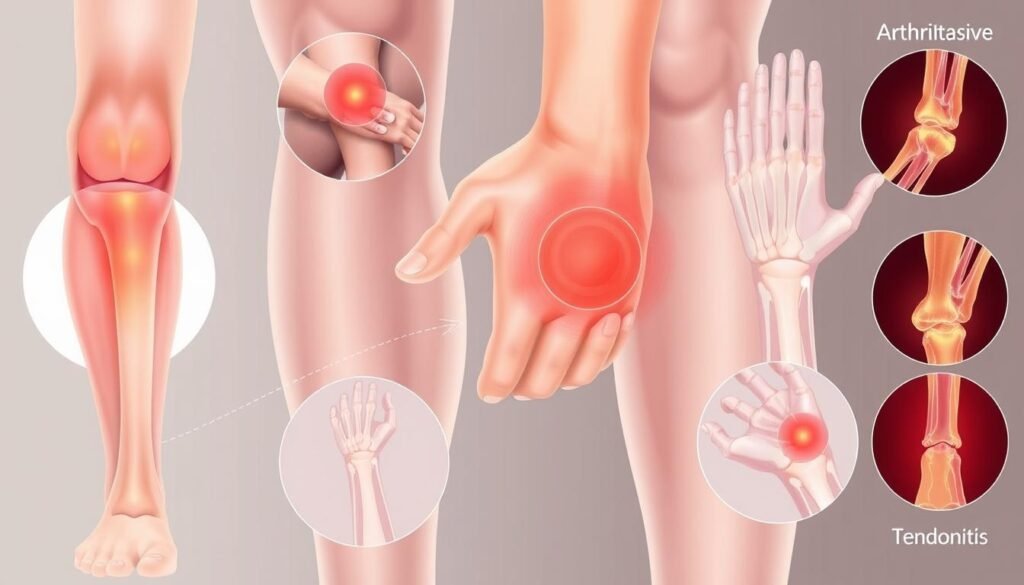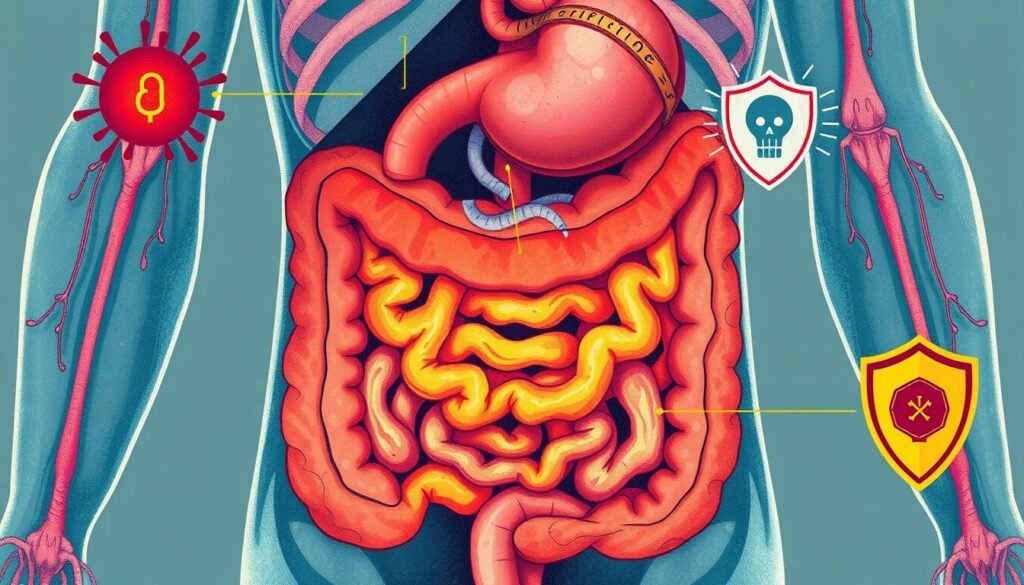Did you know that nearly all individuals with autoimmune diseases feel that fatigue greatly affects their life? This fact underlines the need to catch early signs of autoimmune disease and chronic fatigue syndrome. Many times, these conditions remain unnoticed for too long. Symptoms like lasting fatigue, joint pain, and brain fog aren’t just small problems. They are key signals of deeper health issues.
It’s key to know these early warning signs to diagnose and manage them promptly. According to Dr. Ana-Maria Orbai, symptoms like joint pain, skin problems, stomach pain, fever, or swollen glands can start suddenly. These often hit women harder because of genetic and lifestyle reasons. It’s crucial to seek medical help when these symptoms pop up. This can lead to better treatment results. Knowing about these signs lets people take charge of their wellbeing and better their life quality. For extra info on common symptoms, here’s a useful link about symptoms of autoimmune disease.
Key Takeaways
- Fatigue is a common issue for those with autoimmune diseases, impacting their day-to-day.
- Joint pain and other bodily symptoms are red flags for autoimmune disorders.
- Women have a higher risk of getting chronic fatigue syndrome and autoimmune diseases.
- Finding these conditions early can improve management and treatment results.
- It’s vital to recognize symptoms that overlap to better understand your health.
Understanding Autoimmune Diseases
Understanding autoimmune diseases means knowing the body wrongly attacks its healthy cells. There are more than 80 types, each affecting the body differently. These conditions lead to various symptoms, making it hard to diagnose them.
What are Autoimmune Diseases?
These diseases happen when the immune system mistakenly targets the body’s tissues. This often causes inflammation and harm. Factors like genes, the environment, and infections play roles in these conditions. For example, certain genes raise the risk of autoimmune diseases. More women than men get affected by most of these conditions.
Types of Autoimmune Diseases
There are many types of autoimmune diseases, each impacting the body in its own way. Here are some common ones:
- Rheumatoid arthritis: Around 1% of U.S. people get it, causing joint inflammation and pain.
- Lupus: It’s more common among African American and Hispanic folks, affecting many body parts, including skin and kidneys.
- Celiac disease: Seen in about 1% worldwide, it’s triggered by gluten.
- Multiple sclerosis: Some cases are linked to viruses like Epstein-Barr, harming the nervous system.
- Pernicious anemia: Usually found in older people, it stops the body from absorbing vitamin B12 properly.
Symptoms of autoimmune diseases vary greatly depending on the type and affected area. Lifestyle changes, such as exercising and not smoking, might help manage symptoms and enhance life quality.
Common Symptoms of Autoimmune Diseases
Autoimmune diseases have symptoms that can change daily life. Fatigue, joint pain, and skin rashes are common. Recognizing these symptoms early is key.
Fatigue: More than Just Tiredness
Fatigue in autoimmune diseases is more than being tired. It’s a deep exhaustion that rest doesn’t help. This fatigue makes daily activities hard and lowers quality of life. Inflammation and brain-related factors play a role in this exhaustion. This makes it a major sign of many autoimmune diseases. For more on this topic, check here.
Joint Pain and Swelling
Joint pain is a common issue in autoimmune diseases. This pain, with swelling, limits how much you can move and do everyday. Diseases like rheumatoid arthritis and lupus show these symptoms. It’s important to get medical help fast to manage this pain.
Skin Problems and Rashes
Skin rashes are clear signs of autoimmune diseases. They make people look for medical advice. Diseases like psoriasis and lupus can cause skin problems. These include redness, itching, and irritation. Knowing about these skin rashes helps find the disease early. This leads to better treatment plans.
Signs of Conditions Like Autoimmune Diseases or Chronic Fatigue Syndrome
It’s important to know the signs of chronic fatigue syndrome and autoimmune diseases. They often share symptoms like tiredness, trouble sleeping, and thinking problems. Spotting these early helps start treatment sooner.
Identifying Overlapping Symptoms
Some symptoms are common between autoimmune diseases and chronic fatigue. For example:
- Persistent fatigue: This is a key sign for both.
- Joint pain: It can cause discomfort and swelling.
- Cognitive disturbances: Issues like brain fog disrupt daily life.
Spotting these signs is about looking at all the symptoms together. This helps find the real cause. A thorough check can lead to a faster diagnosis.
Importance of Early Detection
Finding these conditions early can make a big difference in treatment. It lets doctors use specific treatments. This can make life better for those affected. Being aware of the symptoms is key, as tests alone may not catch everything.
Making healthy lifestyle changes and seeking support helps manage these illnesses. Knowing why early detection matters can help people manage their health better.
| Symptom | Chronic Fatigue Syndrome | Autoimmune Diseases |
|---|---|---|
| Persistent Fatigue | Common symptom | Common symptom |
| Sleep Disturbances | Frequently reported | May occur |
| Joint Pain | Less common, but possible | Very common |
| Cognitive Issues (Brain Fog) | Very common | Can occur |
The Role of Fatigue in Autoimmune Diseases
Fatigue is a huge issue for people with autoimmune diseases. It affects their health and daily life deeply. This condition shows up in different ways. Knowing about these types can help in managing it better. Many say fatigue is more than just feeling tired. It’s a hard experience that greatly changes their daily life.
Understanding Different Types of Fatigue
Fatigue comes in several forms, such as:
- Physical Fatigue: This type leads to a feeling of exhaustion after doing very little, making daily tasks hard.
- Mental Fatigue: This causes problems with focusing and remembering things, which is worse in autoimmune diseases.
- Emotional Fatigue: People often feel completely drained emotionally, ending up very sad or feeling helpless.
Getting to know these types of fatigue is important. It helps us understand what patients are going through. It also shows how big a role fatigue plays in autoimmune diseases.
Impact on Daily Life and Activities
Fatigue has a big impact on people with autoimmune diseases. It stops them from being social, working, and taking care of themselves properly. A study found that many with chronic fatigue syndrome have their lives turned upside down by tiredness. This leads to feeling stuck and alone, because they can’t do things they enjoy.
About 80% of CFS cases are not recognized. This shows a need for more awareness to better handle fatigue. Many patients deal with symptoms after viral infections or stress. This shows how closely fatigue is linked to autoimmune reactions.

| Type of Fatigue | Description | Impact on Daily Life |
|---|---|---|
| Physical Fatigue | A feeling of exhaustion, especially after light activity. | Limits ability to perform tasks, often requiring more rest. |
| Mental Fatigue | Cognitive tiredness, affecting focus and memory. | Challenges in maintaining concentration, impacting work and social interactions. |
| Emotional Fatigue | Emotional depletion, leading to feelings of hopelessness. | May result in withdrawal from social activities and increased feelings of isolation. |
Understanding the complex nature of fatigue is key. It has a big impact on day-to-day life for those with autoimmune diseases. Patients and doctors must work together. They need to find ways to handle these symptoms better.
Bone-Aching Fatigue: What Patients Describe
For many who deal with autoimmune diseases, bone-aching fatigue is a huge challenge. It turns everyday tasks into enormous struggles. It’s hard for these patients to explain just how tired they are.
Patient Experiences and Testimonials
Many share how bone-aching fatigue drastically changes their lives. They say:
- The feeling of exhaustion after minimal activity.
- A consistent lack of energy that disrupts both personal and professional lives.
- Challenges maintaining relationships due to the fatigue that often feels insurmountable.
These stories show the big impact fatigue has, making many feel isolated and distressed. It’s important to understand these experiences to bring more compassion and awareness.
Exploring the Emotional Impact of Fatigue
Fatigue doesn’t just affect the body; it hits emotions hard too. Many say they feel:
- Feelings of hopelessness and depression: Constant tiredness can make you feel very down, affecting happiness.
- Increased anxiety levels: Worrying about not being able to do day-to-day tasks can cause a lot of stress.
- Frustration with limitations: It’s hard for them to enjoy things they used to love doing.
This mix of physical tiredness and emotional struggles puts a lot of pressure on people. It’s key to pay attention to both to help those with autoimmune diseases feel better.
| Patient Experience | Emotional Impact |
|---|---|
| Exhaustion after minimal activity | Feelings of hopelessness and depression |
| Lack of energy affecting daily life | Increased anxiety levels |
| Difficulties in relationships | Frustration with limitations |
Joint Pain and Its Importance in Diagnosis
Joint pain is key in diagnosing various autoimmune diseases. Knowing symptoms helps spot potential autoimmune issues early. This leads to faster, better treatment. Different arthritis types show unique signs, so correct diagnosis is crucial.
Common Joint Conditions and Symptoms
Several joint issues are tied to autoimmune diseases, each with its own symptoms:
- Rheumatoid Arthritis (RA): Affects many small joints, especially in hands and feet. It causes inflammation and severe pain.
- Psoriatic Arthritis: Links psoriasis symptoms with joint pain and swelling. It impacts both large and small joints.
- Juvenile Idiopathic Arthritis (JIA): Hits people under 16, leading to inflamed joints for over six weeks.
- Ankylosing Spondylitis (AS): Mostly affects the spine and large joints, possibly reducing spinal movement.
- Gout: Comes from too much uric acid, causing sudden, extreme joint pain.
- Pseudogout: Similar to gout, but caused by different crystals in joints.
It’s vital to catch these conditions early for effective joint pain diagnosis. Spotting the cause of joint pain lets doctors create personalized treatments. Options may include anti-inflammatory drugs, steroids, or biologic treatments for symptom control.

Inflammation’s Connection to Chronic Fatigue
Inflammation plays a big part in health problems, impacting life quality. It has a complex link to chronic fatigue. Knowing this helps manage the condition better.
How Inflammation Affects Daily Living
Inflammation and chronic fatigue change daily life a lot. People feel very tired, have trouble focusing, and find physical tasks hard. Inflammation lowers energy, making daily activities tough.
Handling inflammation well can improve life quality. It’s important to find ways to deal with its effects.
Cytokines: The Role in Autoimmune Disease and Fatigue
Studying cytokines shows us how they’re tied to chronic fatigue. High levels of certain cytokines mean more fatigue. These proteins are released by the body during immune reactions.
They cause tiredness and a feeling of illness. More cytokines can mean worse inflammation and symptoms. Knowing about cytokines’ effects is crucial.
Patients should understand their role in fatigue. Reducing inflammation may help feel better and decrease fatigue. For tips on managing these, visit this resource.
Digestive Issues and Autoimmune Diseases
There’s a strong link between digestive issues and autoimmune diseases. Knowing about this gut-immune connection helps understand many symptoms. This is important for those with autoimmune digestive complaints. Improving gut health can greatly help their overall condition.
The Gut-Immune Connection
Studies show that a troubled gut microbiome might lead to autoimmune diseases. This connection means that gut inflammation could start or make autoimmune responses worse. Many patients with these diseases face a variety of digestive issues. This makes treating them more complex. So, taking care of gut health is key. It can really improve how the immune system works.
Common Digestive Complaints in Patients
Those with autoimmune diseases often have certain digestive problems. These include:
- Abdominal pain and cramping
- Irritable bowel syndrome (IBS)
- Chronic diarrhea or constipation
- Bloating and gas
- Fatigue linked to digestive disturbances
These symptoms can overlap, making it hard to diagnose and treat. Issues like Inflammatory Bowel Disease (IBD), Celiac disease, and autoimmune gastritis show the variety of autoimmune digestive complaints. Conditions like Sjögren syndrome and rheumatoid arthritis, especially in women aged 20 to 50, often go hand in hand with these issues.

Skin Rashes: A Visible Sign of Autoimmune Disease
Skin rashes are often clear signs of autoimmune diseases. These rashes can show that something inside the body isn’t right, leading people to get medical help. It’s key to know about these skin signs for the right diagnosis and treatment of autoimmune diseases.
Types of Rashes Associated with Autoimmune Disorders
The types of skin rashes linked to autoimmune diseases vary widely. Knowing the different kinds helps identify the specific illness. Here are a few common autoimmune rashes:
| Type of Rash | Description | Associated Autoimmune Disease |
|---|---|---|
| Butterfly Rash | Red rash across the cheeks and nose resembling a butterfly. | Lupus |
| Psoriasis Plaques | Thick, red patches covered with silvery scales. | Psoriasis |
| Hives | Raised, itchy welts on the skin’s surface. | Dermatitis |
| Gottron’s Papules | Red or violet bumps on the joints, often accompanying dermatomyositis. | Dermatomyositis |
| Skin Ulcers | Persistent sores that may occur with certain autoimmune conditions. | Vasculitis |
Knowing these autoimmune rashes is key to getting diagnosed and treated quickly. Each rash can hint at a deeper health issue. So, it’s very important to pay attention to your skin. If you see symptoms, recognizing them can be the first step to getting better.
Other Common Symptoms Associated with Autoimmune Disease
Many people with autoimmune diseases deal with common symptoms. These include brain fog, sleep problems, and a lot of headaches. These issues can really affect their lives.
Brain Fog and Cognitive Impairment
Brain fog is a big problem for those with autoimmune diseases. It can make remembering things hard and focusing a challenge. People often feel lost and struggle with daily tasks. Knowing about brain fog is a big step in getting the right help.
Sleep Disturbances and Their Impact
Those with autoimmune diseases often can’t sleep well. They might not be able to fall asleep or stay asleep. This can make fatigue and brain fog worse. It’s a cycle that affects daily life. Making some changes and possibly getting medical help is key to sleeping better.
Headaches and Their Frequency Among Patients
Many dealing with autoimmune diseases suffer from headaches often. These headaches can be really severe, like migraines. Understanding headaches as a symptom of autoimmune disease is important. It helps in talking to doctors and finding ways to manage them. These might include meds, changes in lifestyle, and lowering stress.
These symptoms show how complex autoimmune diseases are. Managing brain fog, sleep problems, and headaches can improve health a lot. It’s important to focus on all parts of the disease. This can really help a person feel better.
| Symptom | Description | Management Strategies |
|---|---|---|
| Brain Fog | Cognitive impairment affecting memory and concentration | Cognitive therapies, mindfulness techniques and regular exercise |
| Sleep Disturbances | Ineffective sleep patterns impacting rest and recovery | Sleep hygiene practices, medication, and relaxation techniques |
| Headaches | Frequent pain varying from tension to migraines | Medications, lifestyle changes, and stress management |
For a deeper understanding of various autoimmune conditions, visit this resource to learn more about their symptoms and management options.
When to Seek Medical Advice
If you’re feeling unusual or have symptoms that won’t go away, it’s important to seek medical advice soon. Knowing the warning signs helps you get help faster, and could lead to better results from treatment. For example, feeling very tired, having stiff joints, or developing rashes are signs you shouldn’t ignore. These could mean you have an autoimmune disease.
Recognizing Red Flags for Medical Attention
Pay attention to certain warning signs that mean you should see a doctor right away:
- Unexplained fatigue that lasts a long time.
- Joint pain that stops you from doing everyday things.
- Skin rashes that don’t get better fast.
- Memory problems or trouble thinking clearly.
- Frequent headaches or migraines.
Importance of Comprehensive Testing and Diagnosis
It’s very important to get medical advice if you think you might have an autoimmune disease like ME/CFS. Getting the right tests done helps doctors figure out exactly what’s wrong. They might look at your medical history, check you over, and run blood tests or other exams.
| Assessment Type | Description |
|---|---|
| Medical History | A detailed account of symptoms and family health history. |
| Physical Examination | An evaluation of physical symptoms and abnormalities. |
| Diagnostic Tests | Blood tests, imaging studies, and other tests to identify specific diseases. |
Unfortunately, many people with ME/CFS aren’t diagnosed. By looking out for the warning signs and getting thorough testing, you can get the right help and support you need.
Conclusion
It’s key to spot autoimmune diseases and chronic fatigue syndrome early. This can greatly help patients. Symptoms like lasting tiredness, joint pain, and thinking troubles really change daily lives. Catching these signs early means doctors can help sooner, making lives better.
Chronic fatigue syndrome isn’t rare, affecting up to 2.5% of people. In the U.S., over 2 million have it, with women more likely to suffer. These numbers show why finding it early matters for good health management.
We need to spread the word about these illnesses. If more know about them, they can get help fast. This leads to better care and a happier life. Everyone, including doctors and patients, must understand these diseases to fight them effectively.